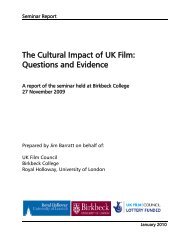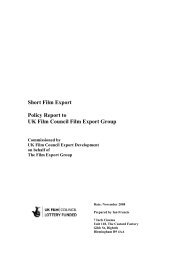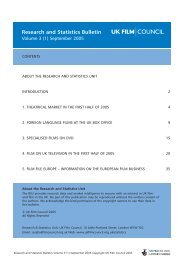Film theft in the UK - Future of Copyright
Film theft in the UK - Future of Copyright
Film theft in the UK - Future of Copyright
Create successful ePaper yourself
Turn your PDF publications into a flip-book with our unique Google optimized e-Paper software.
32<br />
has made pr<strong>of</strong>its from <strong>the</strong> <strong>in</strong>fr<strong>in</strong>gement.<br />
Although this provision seems to have been<br />
<strong>in</strong>tended to permit awards <strong>of</strong> exemplary<br />
damages 42 <strong>the</strong>re rema<strong>in</strong>s judicial uncerta<strong>in</strong>ty as<br />
to <strong>the</strong> precise mean<strong>in</strong>g <strong>of</strong> <strong>the</strong> section. 43<br />
This does not appear to tally with requirements<br />
<strong>in</strong> <strong>the</strong> EC <strong>Copyright</strong> Directive that national law<br />
provide a ‘dissuasive’ remedy for copyright<br />
<strong>in</strong>fr<strong>in</strong>gement. One clear approach appears to<br />
be to amend <strong>the</strong> <strong>Copyright</strong> Designs and Patents<br />
Act 1998, along <strong>the</strong> l<strong>in</strong>es <strong>of</strong> section 128 <strong>of</strong> <strong>the</strong><br />
Irish <strong>Copyright</strong> and Related Rights Act 2000, to<br />
make it clear that exemplary damages should<br />
be available <strong>in</strong> claims for copyright<br />
<strong>in</strong>fr<strong>in</strong>gement. Commonwealth territories such<br />
as Canada, Australia and New Zealand also<br />
provide for similar provisions.<br />
The AACP has lobbied <strong>the</strong> Department for<br />
Constitutional Affairs about <strong>the</strong> issue <strong>of</strong><br />
exemplary damages as a piracy deterrent, but<br />
with little result. No conv<strong>in</strong>c<strong>in</strong>g case has yet<br />
been made why <strong>the</strong> government should not<br />
extend <strong>the</strong> legal concept <strong>of</strong> ‘exemplary<br />
damages’ to cases <strong>of</strong> copyright <strong>in</strong>fr<strong>in</strong>gement.<br />
Exemplary damages are paid as a punitive<br />
measure ra<strong>the</strong>r than compensat<strong>in</strong>g for actual<br />
loss <strong>in</strong> cases where, simply put, <strong>the</strong>re has been<br />
some form <strong>of</strong> malicious <strong>in</strong>tent beh<strong>in</strong>d <strong>the</strong><br />
actions. Given that much organised piracy is<br />
carried out with a clear <strong>in</strong>tent to reap a reward<br />
from ano<strong>the</strong>r’s loss, <strong>the</strong> extension <strong>of</strong> <strong>the</strong><br />
pr<strong>in</strong>ciple would appear logical and persuasive.<br />
Such a move would act as a dis<strong>in</strong>centive by<br />
considerably <strong>in</strong>creas<strong>in</strong>g <strong>the</strong> f<strong>in</strong>ancial risk to<br />
organised pirates.<br />
In addition, or as an alternative, <strong>the</strong> CDPA<br />
could be amended to provide for preestablished<br />
or statutory damages, so that where<br />
it is difficult for a rights owner to prove <strong>the</strong><br />
scale or extent <strong>of</strong> its losses (which also <strong>in</strong>cludes<br />
disclos<strong>in</strong>g <strong>of</strong>ten confidential <strong>in</strong>formation), <strong>the</strong><br />
judge is able to award an appropriate amount<br />
with<strong>in</strong> a set range. Such damages are available<br />
<strong>in</strong> o<strong>the</strong>r countries such as <strong>the</strong> US, Canada and<br />
Israel, and constitute an effective remedy <strong>in</strong> an<br />
area where it is <strong>of</strong>ten impossible to assess <strong>the</strong><br />
extent <strong>of</strong> <strong>in</strong>fr<strong>in</strong>g<strong>in</strong>g activity. The crim<strong>in</strong>al nature<br />
<strong>of</strong> piracy usually means that records show<strong>in</strong>g<br />
<strong>the</strong> extent <strong>of</strong> pirate sales do not exist, or any<br />
that do exist are unreliable.<br />
Whilst camcord<strong>in</strong>g a film <strong>in</strong> a movie <strong>the</strong>atre is a<br />
clear civil <strong>in</strong>fr<strong>in</strong>gement, <strong>the</strong>re is no clear crim<strong>in</strong>al<br />
<strong>of</strong>fence. Section 107 <strong>of</strong> <strong>the</strong> CDPA states that an<br />
<strong>of</strong>fence is committed only if a copy is made “for<br />
sale or hire” and this may not be <strong>the</strong> case. O<strong>the</strong>r<br />
possibly relevant <strong>of</strong>fences must be done “<strong>in</strong> <strong>the</strong><br />
course <strong>of</strong> bus<strong>in</strong>ess”. It is arguable whe<strong>the</strong>r a<br />
person who has camcorded a film and <strong>the</strong>n<br />
passes it to ano<strong>the</strong>r person has distributed <strong>in</strong><br />
<strong>the</strong> sense required by s.107(e), and <strong>in</strong> any event<br />
this will not have occurred if a person is caught<br />
whilst still camcord<strong>in</strong>g.<br />
Prov<strong>in</strong>g crim<strong>in</strong>al <strong>in</strong>tent (beyond reasonable<br />
doubt) is extremely difficult. Even if it is<br />
implausible that someone would be<br />
camcord<strong>in</strong>g for <strong>the</strong> fun <strong>of</strong> it, if <strong>the</strong>y claim <strong>the</strong>y<br />
are, how can it be proved o<strong>the</strong>rwise? That is<br />
why it needs to be illegal per se, or at least<br />
<strong>the</strong>re needs to be <strong>the</strong> presumption that it is<br />
be<strong>in</strong>g done for ga<strong>in</strong>, so that <strong>the</strong> onus is on<br />
someone to prove o<strong>the</strong>rwise.<br />
Specific camcord<strong>in</strong>g legislation has been and is<br />
be<strong>in</strong>g <strong>in</strong>troduced <strong>in</strong> a number <strong>of</strong> US states and<br />
<strong>the</strong>re is a clear need for similar legislation <strong>in</strong> <strong>the</strong> <strong>UK</strong>.<br />
As a result <strong>of</strong> lobby<strong>in</strong>g efforts, <strong>the</strong> Licens<strong>in</strong>g Act<br />
2003 – under which <strong>UK</strong> c<strong>in</strong>emas are licensed –<br />
does conta<strong>in</strong> several provisions relat<strong>in</strong>g to<br />
copyright protection. The net result <strong>of</strong> <strong>the</strong>se is<br />
that licensees stand to lose <strong>the</strong>ir licences – and<br />
potentially <strong>the</strong>ir livelihood – if <strong>the</strong>y fail to observe<br />
copyright arrangements or know<strong>in</strong>gly keep any<br />
goods on licensed premises that have been<br />
imported without duty or unlawfully imported.<br />
International harmonisation:<br />
<strong>the</strong> WIPO Treaties and TRIPS<br />
Due to <strong>the</strong> global nature <strong>of</strong> both <strong>the</strong> Internet<br />
and piracy, it is essential to harmonise

















